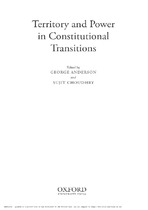| dc.description.abstract | The policy of apartheid was an attempt to territorialize the white/black racial cleavage
through the creation of bantustans, confining black political aspirations to 13 percent
of the country, while the remainder of the country continued under white minority
dominance. This was to be done by fracturing blacks into ethnic-based territories. The
failure of, and resistance to, apartheid resulted in the "constitutional moment" from
1990 to 1996 where the two major protagonists, the white minority, represented by
the National Party (NP) and the African National Congress (ANC) sought to make
the political salience of these manufactured territorial cleavages; they created a new
narrative of a non-racial, non-ethnicity society and thereby undercut the salience of
territory. This project was violently resisted by polities whose very political base lay in
territory- the Afrikaner right wing and Zulu nationalises. However, the non-racial,
non-ethnic narrative was dominant, although allowances were made for very limited
accommodation of ethnic-based territories.
After twenty-five years the unmaking of the salience of territorial cleavages has largely
been successful; territorial policies based on race and ethnicity have largely withered
away. Right-wing Afrikaners and Zulu nationalises' demands for an ethnic homeland
have evaporated. Although ethnicity amongst the Africans has not disappeared, it is
currently well catered for through a weak federal system. The non-territorial black/
white divide, manifested by the continued inequality in wealth between the two racial
groups, is still the dominant cleavage, which has led to the increasing questioning
of title non-territorial comprise between the ANC and the NP over the protection of
property rights. | en_US |

